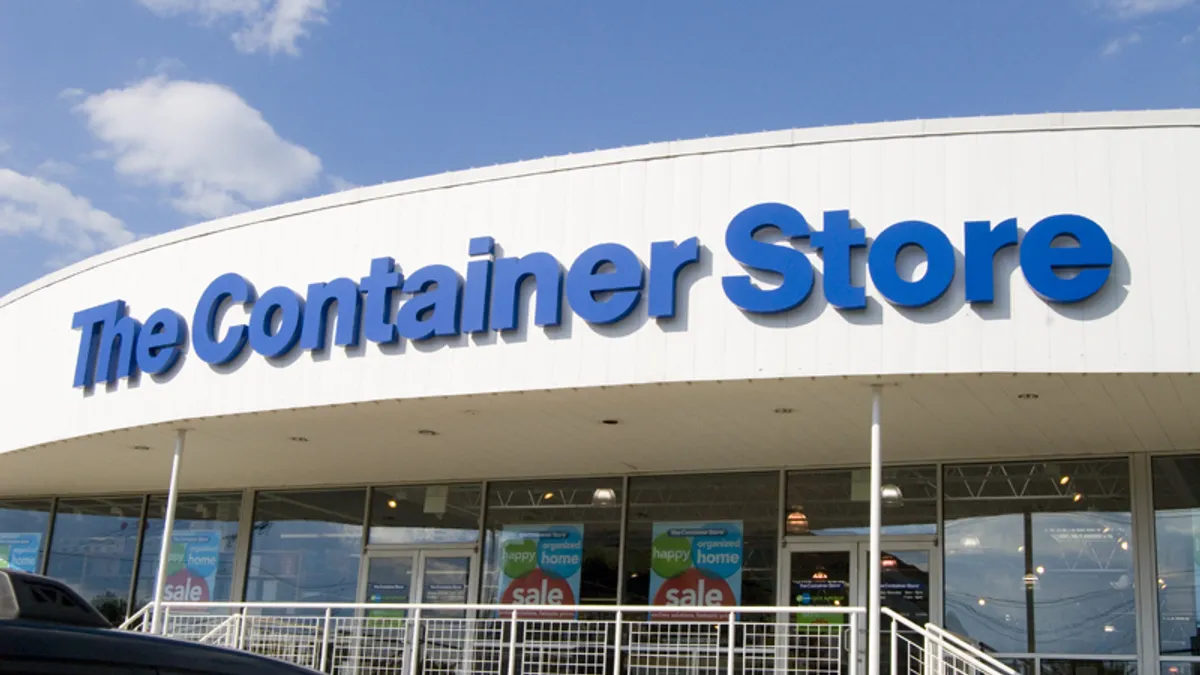Dive Brief:
- The Container Store said Tuesday that first quarter net sales fell 12.2% year over year to $181.9 million. Net sales for the company’s retail business fell 12.1% to $171.5 million, while net loss widened to $14.7 million from $11.8 million in the year-ago quarter.
- Online sales also fell 25.6% year over year. Sales at the company’s third-party custom storage business declined nearly 14% from a year ago to $10.3 million. Store comps also fell nearly 14% year over year.
- The Container Store’s long-term debt rose nearly 17% year over year to $214.5 million from $185.3 million. CEO Satish Malhotra said the company is looking to refinance its credit facility and reiterated that it’s reviewing strategic alternatives.
Dive Insight:
Although sales for The Container Store’s general merchandise assortment remain challenged, the storage and organization retailer’s custom spaces business was a bright spot for the quarter.
“We attribute the change in custom spaces sales trajectory to the enthusiastic response to our Garage+ and Decor+ by Elfa launches and our premium wood-based Preston line, which had the best sales order quarter in its history,” Malhotra said during its Q1 earnings call.
But overall, the latest results “show a company that remains in freefall,” Neil Saunders, managing director of GlobalData, said in emailed comments to Retail Dive. “Not only are sales down by 12% over last year, but they’ve also fallen by almost 31% since the same period in 2022. This is a disastrous performance that is putting enormous pressure on the bottom line where the company made another net loss.”
Malhotra said most customers shop the store’s general merchandise offering, so “it is essential that we focus on ensuring that we are always in stock in the critical traffic-driving core SKUs while still infusing newness and innovation.”
He said The Container Store is doing this by reallocating store space and inventory to better reflect the company’s core storage and organization products. Malhotra also said the company is promoting more of its private label business, which comprises about 45% of general merchandise.
“However, there are also problems with the general merchandise offer where sales are down sharply,” Saunders said. “Container Store is seen by many as being expensive for everyday storage and home products, and in a market where consumers are more focused on value, it is rapidly losing share. Trade is being transferred to generalist retailers, like Target, which have improved their home ranges and offer sharper price points.” Saunders said the company will likely continue to struggle as the housing market remains sluggish, which in turn, slows momentum in residential moves.
Still, the company continues to expand its physical store footprint. It opened a new location in Springfield, Virginia, during the quarter and relocated its downtown San Francisco store.
And just after the quarter ended, the company opened another suburban Washington, D.C. location in Ashburn, Virginia. Malhotra said they plan to continue with two additional store openings in Florida later this year while closing one store by year end. As of June 29, the company had 103 stores, up from 97 a year ago.
Despite pulling back on store openings for fiscal 2025 and beyond, Chief Financial Officer Jeff Miller said they “still see a very large white space for us to continue to expand as the business and the macroeconomic conditions change.”















